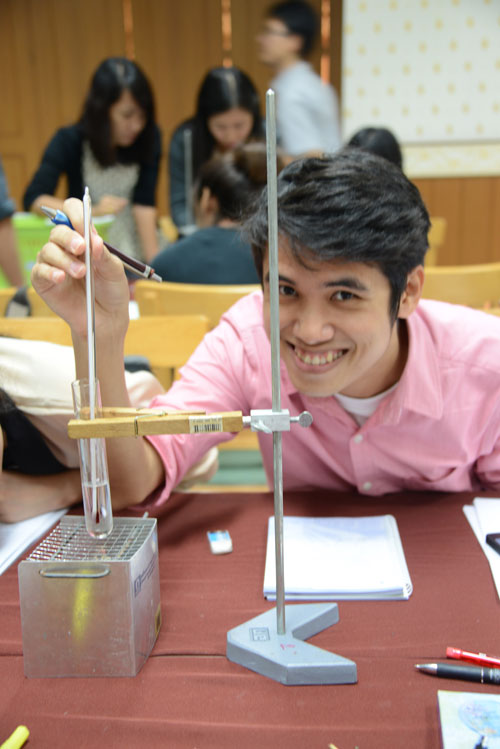Professor Teaches, Learns on Recent Southeast Asian Trip

An honors student in science education at Kasetsart University in Bangkok takes part in a workshop presented by U of A professor Bill McComas.
A University of Arkansas professor made a trip to Southeast Asia this fall to teach aspiring science teachers about important concepts they will soon use in their classrooms. What made this remarkable is the series of events that led to the invitation.
More photos can be seen on the Colleague website.
Several years ago Bill McComas, who holds the Parks Family Professorship in Science Education in the College of Education and Health Professions, gave a speech at an international conference. In attendance was a young Thai lecturer, Pongsprapan Pongsophon from Kasetsart University in Bangkok.
Pongsophon was apparently impressed because when his dean at Kasetsart offered him the chance to spend a year in a post-doctoral fellowship at any institution of higher education in the United States, Pongsophon chose the University of Arkansas in order to study with McComas. In 2011, Pongsophon spent a year at the U of A where he sat in on science education classes, traveled to various conferences and worked on several articles and presentations as part of the graduate program in science education.
Pongsophon returned to his teaching position in Bangkok and invited McComas to work with him again, this time on the other side of the ocean.
As part of his visit, McComas gave a two-day workshop at Kasetsart University for 40 final-year honors students in science education who plan to be secondary-level teachers. Five professors from Kasetsart University also attended.
The workshop focused on issues surrounding the nature of science, what McComas calls “a rich description of science; how it works, how scientists operate as a social group and how society itself both directs and reacts to scientific endeavors.” The field draws from aspects of history, sociology and philosophy of science, blending these disciplines together to make science instruction more effective and engaging.
The workshop in Thailand was a learning experience for him as well as for the participants, McComas said.
“I learned how to take a semester’s worth of content and deliver it in a short but intense format,” he said.
The students had a good grasp of English, although an interpreter would wrap up each session with explanations in Thai to make sure that they understood the concepts covered.
“The workshop had a major hands-on component,” McComas said. “We talked about the importance of empirical evidence. In one exercise, I asked students to take sunflower seeds and present something about the seeds based on evidence. It was surprising what they did with this simple task.
“Some described the black-and-white patterns on the shells and others cracked the shells and weighed the seeds inside,” McComas continued. “A real challenge of teaching about the philosophy of science is to get teachers thinking about how to weave the philosophical concepts into their content all year long. That’s not common in the United States and even less common in other countries so the workshop in Thailand was an important test bed of some strategies I have been developing.”
While he was in Southeast Asia, McComas was also invited to attend a meeting of the International Council of Associations of Science Education in Kuching, Malaysia, on the island of Borneo. He gave a keynote talk about the challenges of evolution education. The meeting was part of the World STEM exposition and drew about 500 attendees.
“The challenges of teaching about evolution are vast,” McComas said. “In some parts of the world, evolution has never been taught and teachers are looking for instructional methods to support evolution education. Unfortunately, as in the U.S., evolution instruction has been attacked so teachers are interested in rationales to support the inclusion of evolution.”
Contacts
Heidi Wells, director of communications
College of Education and Health Professions
479-575-3138,
heidisw@uark.edu
Headlines
PetSmart CEO J.K. Symancyk to Speak at Walton College Commencement
J.K. Symancyk is an alumnus of the Sam M. Walton College of Business and serves on the Dean’s Executive Advisory Board.
Faulkner Center, Arkansas PBS Partner to Screen Documentary 'Gospel'
The Faulkner Performing Arts Center will host a screening of Gospel, a documentary exploring the origin of Black spirituality through sermon and song, in partnership with Arkansas PBS at 7:30 p.m. Thursday, May 2.
UAPD Officers Mills and Edwards Honored With New Roles
Veterans of the U of A Police Department, Matt Mills has been promoted to assistant chief, and Crandall Edwards has been promoted to administrative captain.
Community Design Center's Greenway Urbanism Project Wins LIV Hospitality Design Award
"Greenway Urbanism" is one of six urban strategies proposed under the Framework Plan for Cherokee Village, a project that received funding through an Our Town grant from the National Endowment for the Arts.
Spring Bike Drive Refurbishes Old Bikes for New Students
All donated bikes will be given to Pedal It Forward, a local nonprofit that will refurbish your bike and return it to the U of A campus to be gifted to a student in need. Hundreds of students have already benefited.




